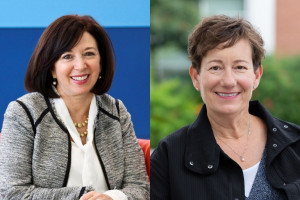Q&A: Merck Is Partnering With U.S. Cities to End Maternal Mortality
Here’s how the legacy pharma company is working to ensure safer pregnancy and childbirth experiences for moms in Philadelphia.

Lead and executive director of the Merck for Mothers initiative, Dr. Mary-Ann Etiebet / Courtesy photo
For decades, pharmaceutical giant Merck & Co. has played a key role in addressing global health issues, including maternal mortality. In 2010, the company launched Merck for Mothers, a $500 million ten-year initiative to improve the health and well-being of mothers before, during, and after pregnancy and childbirth. So far, the initiative has connected with more than 160 partners to implement more than 100 maternal care programs in more than 48 countries.
Here in Philadelphia, Merck partnered with the Maternity Care Coalition (MCC) to offer specialized support to pregnant women and parenting families throughout Southeastern Pennsylvania, with a focus on neighborhoods with high rates of poverty, maternal and infant mortality, health disparities, and changing immigration patterns.
With the initiative nearing its close in 2021, NextHealth PHL sat down with Dr. Mary-Ann Etiebet, the lead and executive director of Merck for Mothers, to learn more about Merck’s new Safer Childbirth Cities Initiative, and how the company’s efforts in maternal healthcare might help ensure equitable care for mothers in the Philadelphia region and beyond.
NextHealth PHL: What made you decide to join the Merck for Mothers initiative?
Etiebet: I’ve been working with Merck for Mothers for about four years. I grew up in Nigeria where everyone knew someone who had died in childbirth; it had been normalized. It was one of those things that, even as a young person, I knew should not be the case.
So my professional career took me into areas of medicine that really focused on taking care of vulnerable populations. I started my work in HIV and some of the work we did was in preventing maternal to child HIV transmission. I noticed that while we provided treatment to prevent transmission to the child, we’d stop treating the mother after she had given birth. I knew we needed to be taking care of those mothers over a lifetime, not just because they were giving birth to a child. That has always stayed with me. To be able to join the Merck for Mothers team that is committed to making sure mothers get the care that they need has been a wonderful opportunity.
Some of my family immigrated to this country looking for better for their children in terms of healthcare but unfortunately, my sister-in-law gave birth in a hospital in New York City and died. So, maternal mortality is not something you can run away from or escape. In the U.S., we have rates just as high as in countries that we call developing and poor nations. That needs to change.
Philadelphia sees 27 deaths for every 100,000 live births, placing the city among those with the highest maternal mortality rates in the country. What are some of the key factors driving these statistics?
Previously we were not collecting data on maternal mortality. So you may have heard the saying “If you don’t count something it doesn’t matter.” In this case, things were happening that we weren’t aware of. We worked with the Centers for Disease Control (CDC) and other partners to generate the data we needed to raise awareness and inform our initiatives. What we found is that not all women have access to quality prenatal care, more women are entering pregnancy with other medical conditions that put them at greater risk for emergencies, and not all hospitals are prepared to identify and respond to some of these emergencies during childbirth.
But what we’ve found, so far with Merck for Mothers, is that when we work with these hospitals to help them appropriately respond to these emergencies, the women do have better outcomes. So we know we need to continue to strengthen local health systems and providers so they can provide the optimal care these families need.
Does maternal mortality affect some demographic groups more than others?
Black women are bearing the brunt of maternal mortality. Even though we see black women having the same prevalence, they’re still two to three times more likely to die in childbirth compared to their white counterparts. We still need to dig deeper to understand why that is the case.
In general, we’re seeing that black women are dying in hospitals that are not of as high quality or not as resourced as other hospitals. That has to change. But the thing that we hear most from black women is that many times they are not listened to, their experiences are not respected, and their needs are not addressed. There is still systemic racism and other issues in our nation that affect care. Until we get to the root of that and provide everyone who’s working with women along the pregnancy journey with the skills and tools to better serve all women, we’re not going to see these trends change.
What have you accomplished so far and what’s next for the program?
We are currently offering programs in 48 countries across the globe, and through those programs we’ve increased access to quality care and services to over nine million women. We continue to focus on empowerment and improving the quality of care in hospitals and health systems. What we’ve done, to date, is make sure we are generating and communicating data so that, across the nation, advocates and policymakers can use this information to change what’s happening in their communities. These women’s stories pull us in, but it’s the data that prompts people to action.
So far, we’ve focused on New York, California, and Georgia, where we’re expanding what we’ve learned by partnering with organizations like the Institute for Healthcare Improvement to make sure these practices can get scaled to all 50 states. We’re also making sure these practices are informed by women and minority voices so we’re not seeing a widening of the gap as the rates get reduced.
What is the Safer Childbirth Cities initiative and what should we expect to see next from this program?
We announced the Safer Childbirth Cities initiative in late 2018. The program is intended to reduce the number of maternal deaths and life-threatening childbirth events and narrow disparities in maternal health outcomes in the U.S. So, we will be supporting local organizations at the city level by providing them with grants to implement creative solutions that will reduce poor maternal health outcomes. Each of the cities will be able to learn from each other. If one city is doing a great job, we want to know what those best practices are, and we want to be able to translate them across the country.
We put out a call for partners and received 77 responses. We’ve whittled it down to ten cities that we’ll be able to support with the help of some co-funders. We hope to publicly announce who those cities will be and who our co-funders will be sometime in September 2019.
Will Philadelphia be one of those cities?
You’ll have to wait and see.


